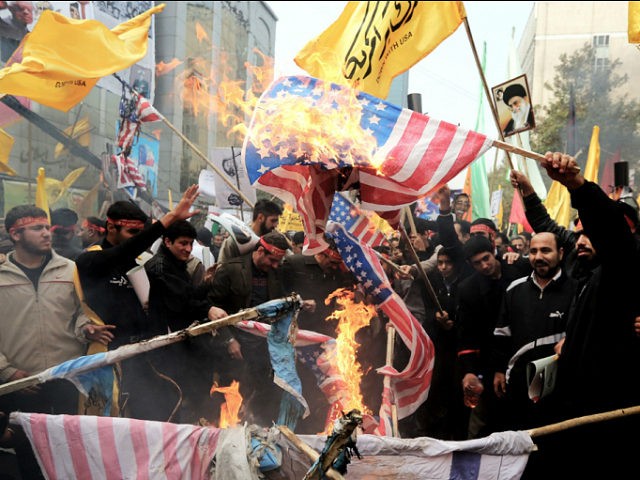Iran’s parliament voted almost unanimously to increase spending on its missile program and the terrorism-exporting, ayatollah-controlled Revolutionary Guard on Sunday. The lawmakers chanted, “Death to America!” after taking the vote.
Voice of America notes that “moderate” President Hassan Rouhani is expected to support the bill, as is the theocratic Guardian Council. Rouhani argued that the increased spending on missiles, terrorism, and even research for nuclear-powered warships “very wisely tried not to violate” the nuclear deal – which, given the quality of Obama’s negotiations, is probably true.
“The bill also imposes a visa and travel ban on U.S. military and security organizations and their commanders who have provided financial, intelligence, military, logistic and training support to terrorists in the region, naming the Islamic State group and the Syrian branch of al-Qaida,” VOA reports, noting that Shiite Iran frequently accuses the United States of covertly supporting Sunni extremist groups like ISIS, even though it overtly leads military campaigns against them.
The Iranian parliament also bans visas for American officials who have met with an Iranian dissident group called Mujahedeen-e-Khalq (MEK). The MEK began as a splinter group of the Khomeini revolution that turned against the government Ayatollah Khomeini created with such vigor that it was even willing to work with Saddam Hussein’s army during the Iran-Iraq War of the eighties. The group is also noted as a key player in disclosing the existence of Iran’s nuclear weapons program. Contacts between American officials and the group, which has been listed and de-listed as a terrorist organization by the U.S. government over the years, have long been controversial.
Iran has a lot of work for the Revolutionary Guard to handle with its increased funding. The Times of Israel reports on a Sunday warning from Mossad chief Yossi Cohen that Iran is racing to fill the power vacuum in Syria created by the collapse of ISIS. Iran racing to dominate former Islamic State territory so it can create a “land bridge” between through Syria to Lebanon, facilitating the movement of fighters and weapons.
Cohen also warned that Iran is using its proxy forces to secure territory inside Lebanon itself, as well as Yemen. He specifically blamed the JCPOA, Obama’s nuclear deal, for strengthening “Iranian aggression in the region” and said Tehran is still very interested in developing nuclear weapons.
Iran’s terrorist proxy Hezbollah certainly feels emboldened by the nuclear deal. On Sunday, Hezbollah leader Hassan Nasrallah bragged that the Trump administration “will not be able to damage the strength of the resistance.” His confidence is based, in part, on Lebanese officials claiming there is no further room for the U.S. to sanction Hezbollah without inflicting grievous damage upon the national economy.
Nasrallah also claimed European and American officials have been attempting to bully Hezbollah into unspecified concessions by warning that Israel will attack Lebanon if they do not comply.
German media reported over the weekend that “Western intelligence services” believe Russia has been helping Iran get around U.N. sanctions that remained in place after the nuclear deal, specifically by using Russia’s air base in Syria to ship Iranian heavy weapons to Russia for maintenance.
The German reports portray this pipeline as a “smuggling route” that covertly reinforces Russia’s publicly stated desire to “intensify military and technological cooperation” with Iran. Russia’s state-run media denied the smuggling allegations and insisted Russia and Iran are fully compliant with U.N. Security Council resolutions.
Russia has been doing everything it can to preserve the Iran nuclear deal. “It’s a pity that such a successful treaty is now somewhat being cast into doubt,” Foreign Minister Sergey Lavrov declared on Friday.
While it gleefully spends the money it received from the nuclear deal on missiles, territorial acquisitions, and destabilizing adversary governments, Iran interprets the JCPOA as a one-sided boon to Tehran that makes all U.S. sanctions for any reason illegal.
Iranian Deputy Foreign Minister Abbas Araqchi restated this argument on Friday, denouncing U.S. sanctions against Iran’s “defensive” missile program as an “unacceptable” violation of the nuclear deal and hinted American sanctions could make “successful implementation” — i.e. Iran living up to its obligations under the agreement — more difficult. Two days later, the Iranian parliament voted to slap new sanctions on the United States.

COMMENTS
Please let us know if you're having issues with commenting.